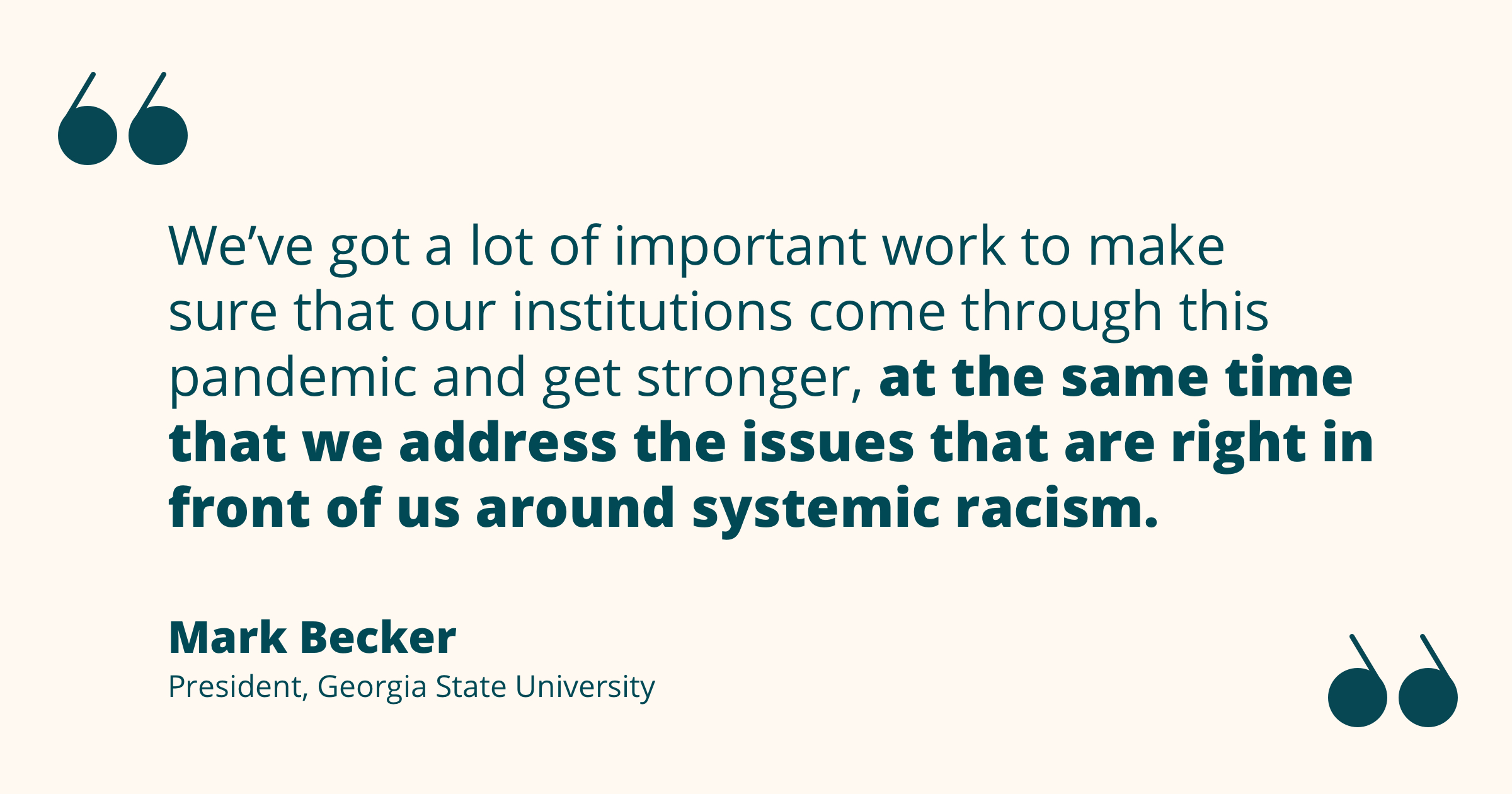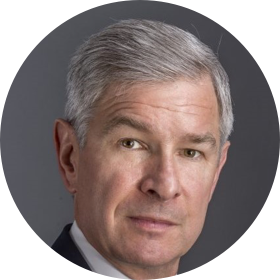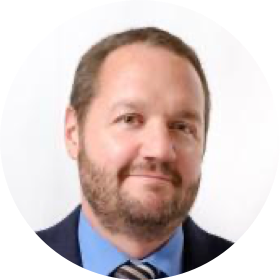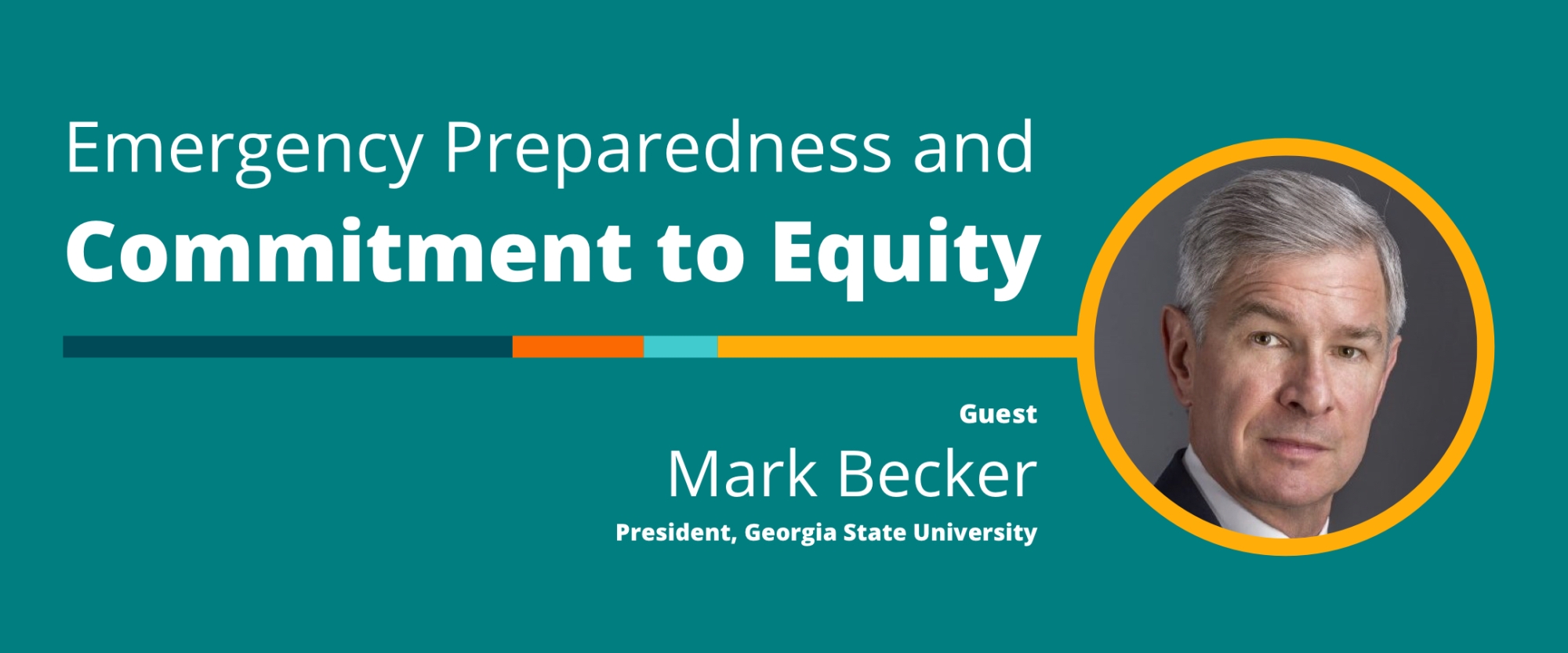Note: This interview, Episode 11 of the Weekly Wisdom Series, originally aired on June 29, 2020 as part of the University Innovation Alliance’s Innovating Together podcast, appearing live on Facebook, Twitter, and LinkedIn.
The University Innovation Alliance (UIA) is proud to present the Innovating Together podcast, a weekly event created in partnership with Inside Higher Ed. I'm Executive Director of the UIA, and my co-host for this broadcast was Paul Fain, Inside Higher Ed's Contributing Editor. In Episode 11 of Innovating Together's Weekly Wisdom series, we spoke with Dr. Mark Becker, President of Georgia State University. This institution has seen tremendous growth and innovation during President Becker's tenure, and we were eager to hear his wisdom about how such a large institution with such a diverse student population is able to operate during the COVID-19 pandemic and the George Floyd protests. His practical perspective and optimistic vision were, to say the least, inspiring.
A Pivotal Moment
President Becker sees the confluence of the COVID-19 pandemic and the George Floyd protests as higher education's unique moment in history. "It’s a historic time in terms of, as a country, confronting the issues of systemic racism," he said, "and change is needed across all sorts of institutions, including higher ed, at the same time that we confront a hundred-year pandemic, something that none of us has ever lived through before. The way, I think, to look at this is that you have to be flexible. You have to accept that there is just a tremendous amount of uncertainty. We’ve got a lot of important work to make sure that our institutions come through this pandemic and get stronger, at the same time that we address the issues that are right in front of us around systemic racism."

Emergency Preparedness
Unlike many of his counterparts at other schools, President Becker has a background in emergency preparedness from his tenure as dean of the School of Public Health at the University of Minnesota. "When we went through SARS, I ended up with the title of Assistant Vice President for Emergency Preparedness and Public Health Response, or something like that," he recalled. "That was the institutional response that we had, handling the SARS epidemic of 2003. We did a lot of contingency planning, the sorts of things that every university is thinking about right now. Suppose you have a student at a residence hall who is now infected, and that individual needs to be isolated, and some other individuals need to be quarantined. How are we going to make sure they get fed? How are we going to make sure they get proper healthcare, et cetera? That’s a toe-in-the-water version of what we’re dealing with now with a much more infectious agent of SARS-CoV-2, the virus that creates COVID-19."
A Commitment to Student Success
President Becker keeps his leadership team inspired by reminding them how G.S.U.'s student success rate is now more important than ever.
"Sixty percent of our students are Pell eligible – we’re a majority minority institution, populations that historically have had much lower success rates, much lower participation rates, much lower completion rates," he explained. "We’ve been able to move that needle so that their success rates are much higher, and we’ve become a larger institution able to accommodate a large, very diverse student body. These same students are the most fragile right now. They generally work in the service industries part time while going to school. We have to continue providing the best educational experience and outcomes for students who, historically, have been disadvantaged, because these are the students that are going to create the future for this country. So it’s with that higher goal that we have to continue to stay committed and really continue to up our game so that we do even better for them and for society."
Recalling his senior leadership experiences during the economic fallout after 9/11 and at the start of the Great Recession, President Becker cautioned, "In both of those cases, and certainly now, what you cannot afford to do if you’re in a leadership role is to get so focused on just the moment that you forget about the direction you’re going. You have to have that North Star out there guiding you. The metaphor I’ve used to talk about this is we’re on a sailing ship, tossed about in a storm. We’ve got to make sure that when the storm does clear – because the storms always clear – we’re pointed in the right direction, and we have wind in our sails. So absolutely, we have to stay committed to our core mission of being able to recruit diverse students, educate them, help them be prepared for success throughout life; at the same time that we attend to our research and other institutional priorities."
His ongoing conversation with other higher ed leaders about systemic racism in America has reaffirmed his mission. "They’ve all emphasized their need to eliminate gaps," he told us. "That the rest of my colleagues are now seeing this the way that we’ve seen it and wanting to commit to it, for me, is only reaffirming that the work we’ve done has been the right work to do. It’s certainly what’s best for our students, my city, my state, but it’s never been more important than it is today, and it’s never been more important to get that word out to the whole country."
Predicting a Flexible Future
When we asked President Becker about his predictions for the state of post-pandemic higher ed, he offered an exciting vision of student engagement. "If I look out one, two, three, five years, I do see that our curriculum is going to offer a much more robust set of modalities," he said, "offerings that are either entirely online or more of a hybrid structure. I hope that we’ll have a model where students will be able to engage in their passions and in their futures earlier on. The traditional way is that you wanted to encourage students to get an internship between their junior and senior years. With this more flexible model, students will be able to take on internships, say, as early as the sophomore year and do it while they’re in school, not just in the summers in between, getting more practical experience, perhaps taking a look at different career opportunities within their educational pathway. That’s the one I’m most excited and optimistic about, because I think, as we develop this infrastructure, all of our students will have greater opportunity for deeper and richer experiences."
How to Avoid Burnout
This year, with remote communication reducing opportunities for spontaneous, face-to-face conversations, we asked President Becker how he's able to get all the information he needs to effectively lead an institution the size of G.S.U.
"You’ve hit on the hardest problem right now," he agreed. "There certainly are people that are outside of my immediate sphere that I call and check in with, but there are only so many hours in the day when you’re programmed so heavily, and you don’t want to spend all your time completely plugged in, because people are going to burn out. My single biggest concern about everybody that’s working on strategically making sure that our institutions move forward to address all the issues of the day – including, very importantly, systemic racism – is that people are going to get completely burned out. We may be in this mode for another 12 months. I don’t have a miracle answer at this point, and it’s one that I’m struggling with."
He shared his personal strategies for avoiding that burnout. "There’s a certain point in the evening where I just turn the phone over and, unless it goes crazy, I just ignore it," he admitted. "The other thing is, when I wake up in the morning, my first priority is to get in my workout for the day. That’s usually physical activity like bike riding and getting out and being outside and moving around. I’ve got this block of time that is mine, because once you do start to engage with the day, it holds onto you until you come to that shutdown point. It takes a certain amount of self-discipline. It certainly, for me, wasn’t natural. I had to pretty much force myself to be able to shut down in the evenings. The other thing is that we all have passions, hobbies, interests." For President Becker, that means escaping onto YouTube to check out the Global Cycling Network, Trevor Noah, and Stephen Colbert.
Power of the Human Spirit
Despite the hard work of responding to this moment's historic challenges, President Becker left us on an optimistic note. "I’m a glass is half full person," he told us. "I’ve been around long enough, lived and worked through enough, to know that, as hard as it looks, we will adapt. I’ve seen tremendous improvements in higher education, in all aspects of society. I see lots of challenge and controversy out there, but I can’t let that get me down, because it’s the human spirit that lifts us up. It’s that people care enough to do the work that matters, whether it’s to take care of their fellow man, whether it’s to make sure that others have opportunities that we didn’t have, whatever it may be that drives you. I think that’s what gives me reason to believe that, not only will we get through this virus and this pandemic, but I think, as a country, we’ll make tremendous progress in eliminating the issues of structural racism that have been so pernicious and devastating to society. We’re going to get better. We’re going to do better. We will overcome."
Links Mentioned in This Episode
• Georgia State University
• George Floyd protests (as reported in TIME magazine)
• SARS epidemic of 2003
• Economic fallout after 9/11
• Great Recession
• Global Cycling Network
• Trevor Noah
• Stephen Colbert
Bios of Guest and Co-Hosts

Guest: Mark P. Becker, President, Georgia State University
Since beginning his tenure as Georgia State University’s seventh president in January 2009, Dr. Mark P. Becker's ambitious vision has led the institution into an unparalleled period of growth and advancement to become one of the nation’s premier urban research universities. He was named one of America’s ten most innovative university presidents in 2015 by Washington Monthly. The university has become a widely recognized national leader for its programs and initiatives fostering student success and, as one of America's largest and most diverse universities, was ranked third most innovative university in the country by U.S. News & World Report in 2020. G.S.U.'s need- and merit-based scholarship funds have tripled under Dr. Becker's leadership, while the university has set fundraising records. He was instrumental in launching initiatives to hire exemplary senior faculty, creating new research centers, and increasing G.S.U.'s global role through partnerships with universities in rapidly growing economies. Prior to his appointment as G.S.U. president, Dr. Becker served as Executive Vice President for Academic Affairs and Provost at the University of South Carolina, and Dean of the School of Public Health and Assistant Vice President of Public Health Preparedness and Emergency Response at the University of Minnesota. From 1989 to 2000, he was a professor in the Department of Biostatistics at the University of Michigan’s School of Public Health, where he also held appointments in the Institute for Social Research and the Department of Statistics, and served as Associate Dean for Academic Affairs. He has held academic appointments at the University of Washington, the University of Florida, and Cornell University. He is a Fellow of the American Statistical Association and the American Association for the Advancement of Science and has been principal investigator on research grants from the National Institutes of Health and the National Science Foundation. Dr. Becker attended Harford (Maryland) Community College, earned his bachelor’s degree in mathematics from Towson State University in 1980 and his doctoral degree in statistics from the Pennsylvania State University in 1985. He grew up in Havre de Grace, Maryland, near Baltimore.

Co-Host: Bridget Burns, Executive Director, University Innovation Alliance
Dr. Bridget Burns is the founding Executive Director of the University Innovation Alliance (UIA). For the past decade, she has advised university presidents, system chancellors, and state and federal policy leaders on strategies to expand access to higher education, address costs, and promote completion for students of all backgrounds. The UIA was developed during Bridget’s tenure as an American Council on Education (ACE) Fellowship at Arizona State University. She held multiple roles within the Oregon University System, including serving as Chief of Staff and Senior Policy Advisor, where she won the national award for innovation in higher education government relations. She was a National Associate for the National Center for Public Policy and Higher Education, and has served on several statewide governing boards including ones governing higher education institutions, financial aid policy, and policy areas impacting children and families.

Co-Host: Paul Fain, Contributing Editor, Inside Higher Ed
Paul Fain joined Inside Higher Ed in September 2011 after six years covering leadership and finance for The Chronicle of Higher Education. He has also worked in higher ed P.R., with Widmeyer Communications, but couldn't stay away from reporting. A former staff writer for C-VILLE Weekly in Charlottesville, Virginia, he has written for The New York Times, Washington City Paper, and Mother Jones. His journalism awards include one for beat reporting from the Education Writers Association and the Dick Schaap Excellence in Sports Journalism Award. Paul got hooked on journalism while working at The Review, the student newspaper at the University of Delaware, where he earned a degree in political science in 1996. A native of Dayton, Ohio, and a long-suffering fan of the Cincinnati Bengals, he plays guitar in a band with more possible names than polished songs.
About Weekly Wisdom
Weekly Wisdom is an event series that happens live on Facebook, Twitter, and LinkedIn. It also becomes a podcast episode. Every week, we join forces with Inside Higher Ed and talk with a sitting college president or chancellor about how they're specifically navigating the challenges of this moment. These conversations will be filled with practicable things you can do right now by unpacking how and why college leaders are making decisions within higher education. Hopefully, these episodes will also leave you with a sense of optimism and a bit of inspiration.
Rate, Review & Subscribe
Learn why hundreds of people have rated this new podcast 5 stars! Please join others and rate and review this podcast. This helps us reach and inform more people -- like you -- to help increase the number of college graduates in the United States.
Click here, scroll to the bottom, tap to rate with five stars, and select “Write a Review.” Then be sure to let us know what you loved most about the episode! Also, if you haven’t done so already, subscribe to the podcast. We’ll be adding a bunch of bonus episodes to the feed and, if you’re not subscribed, there’s a good chance you’ll miss out.

